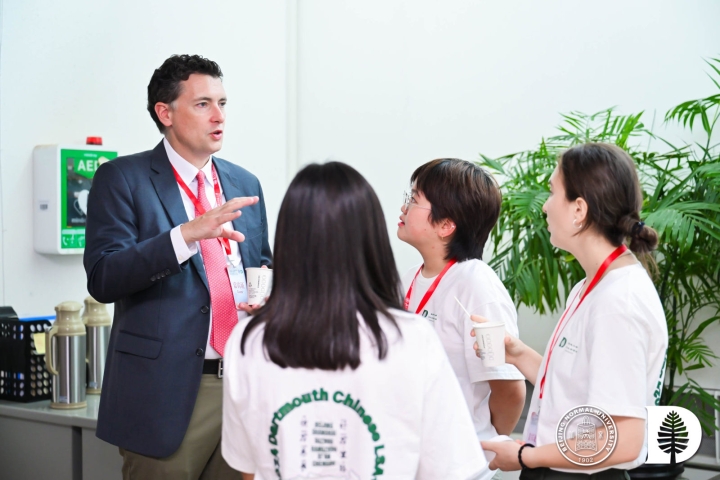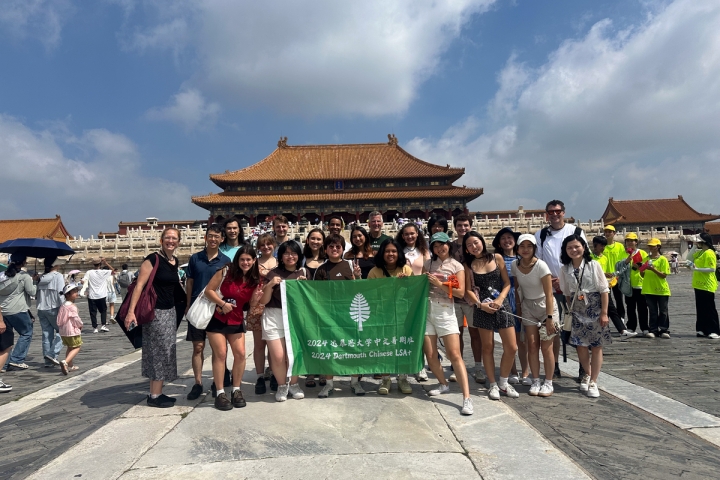After a five-year hiatus due to the COVID-19 pandemic, the Department of Asian Societies, Cultures, and Languages’ Language Study Abroad program returned to Beijing this summer. Fifteen students took part in 10 weeks of language immersion and cultural studies at Beijing Normal University in China’s capital.
Associate Professor Edward Miller, chair of Asian Societies, Cultures, and Languages, says the LSA program offers students a chance not only to advance their Chinese language skills with faculty at the renowned university, but also to gain insight into Chinese culture and society by interacting with Chinese people in everyday life.
The cultural component of the program was taught by Dartmouth’s LSA Faculty Director Lei Yan, senior lecturer in Chinese and a graduate of BNU and Peking University.
“The single most important thing about this program is that Dartmouth students have the opportunity to go to China and to meet Chinese people from all walks of life in all kinds of different contexts—in classrooms, on excursions, in restaurants, in taxi cabs,” Miller says. “This is so important as far as helping Dartmouth students to understand the lives and experiences of people in China today.”

Yan also led the group on trips to important cultural locations in China, including Xi’an, Chengdu, and Shanghai.
In this time of international tensions in U.S.-China relations, Miller says, gaining cultural insight into life in China is a tremendous benefit to Dartmouth students as they go on to careers in areas such as diplomacy, business and finance, and international development.
“Getting Americans and Chinese meeting together, learning together, understanding each other, and building mutual understanding, that’s what this program is all about,” Miller says.
That partnership with BNU, which not only allows Dartmouth students to study in China but brings BNU faculty to Dartmouth to teach Chinese language classes, was established in 1982—just three years after the United States normalized its relations with China.
Because the LSA was canceled from 2020 through 2023 due to the COVID-19 pandemic, BNU hosted a 40-year commemorative event during the LSA in July and invited a delegation of Dartmouth faculty and administrators who have been instrumental in the program to Beijing for a special event.
The ceremony was also attended by the LSA students and members of the Dartmouth Club of China.
According to Yan, this year’s LSA director in China, her goal in developing the curriculum was to enable students to engage in a broad range of interactions in order to foster first-hand cultural competency.
“Students come to China to study and live, experiencing the most authentic aspects of life in China. They use apps to enjoy various services, such as ordering food delivery and calling taxis. They travel to different cities, take buses and subways, chat with teachers and people from different walks of life,” Yan says. “This helps them think from different perspectives and deepens their understanding of different cultures and societies.”
LSA student Lin Lin ’26, who grew up in Philadelphia, says the trip was culturally important to her.
“As a Chinese American student who is studying Chinese in college and going back to Beijing my sophomore summer, I wanted to actively practice restorative bilingualism, where rather than striving to perfect the language itself, the pursuit of the process was enough. I was determined to go back to Beijing this summer because I was able to physically entangle myself with a place that I’ve been connected to since I was born,” says Lin, who is studying geography modified with human-centered design.
In addition to Miller and Yan, the Dartmouth delegation at the July 27 commemoration ceremony included Mark Williams, associate professor of film and media studies and a specialist in international film history; Gil Raz, associate professor of religion and a specialist in Chinese religion; Lu Yi, assistant professor of history and a specialist in modern Chinese history; Shucheng Zhang, lecturer in Chinese; and Shino Pichette, associate director of operations at the Guarini Institute for International Education.
“I think that the takeaway from the commemoration ceremony,” Miller says, “was that both sides are more committed to this relationship than ever before. That we both place an extremely high value on academic exchange, and especially on the person-to-person exchange. So the relationship is an institutional one, but what really came through is the personal connections among faculty and among students.”
